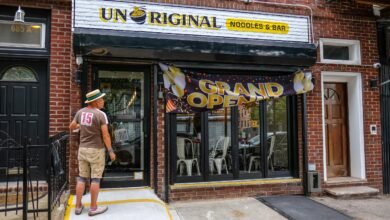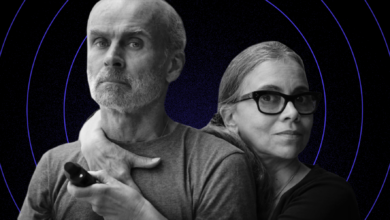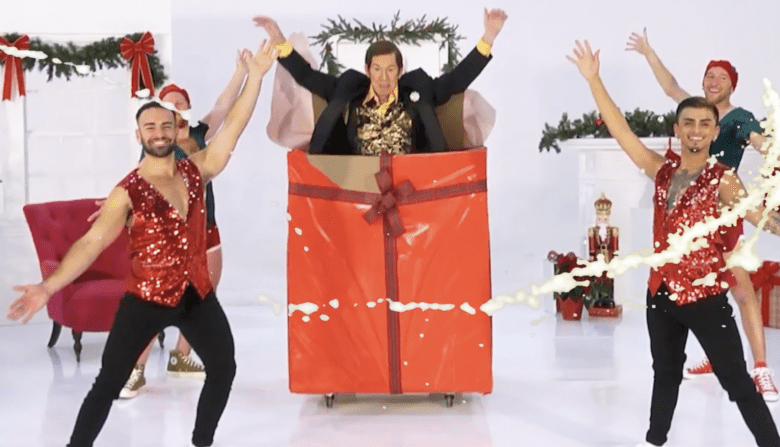
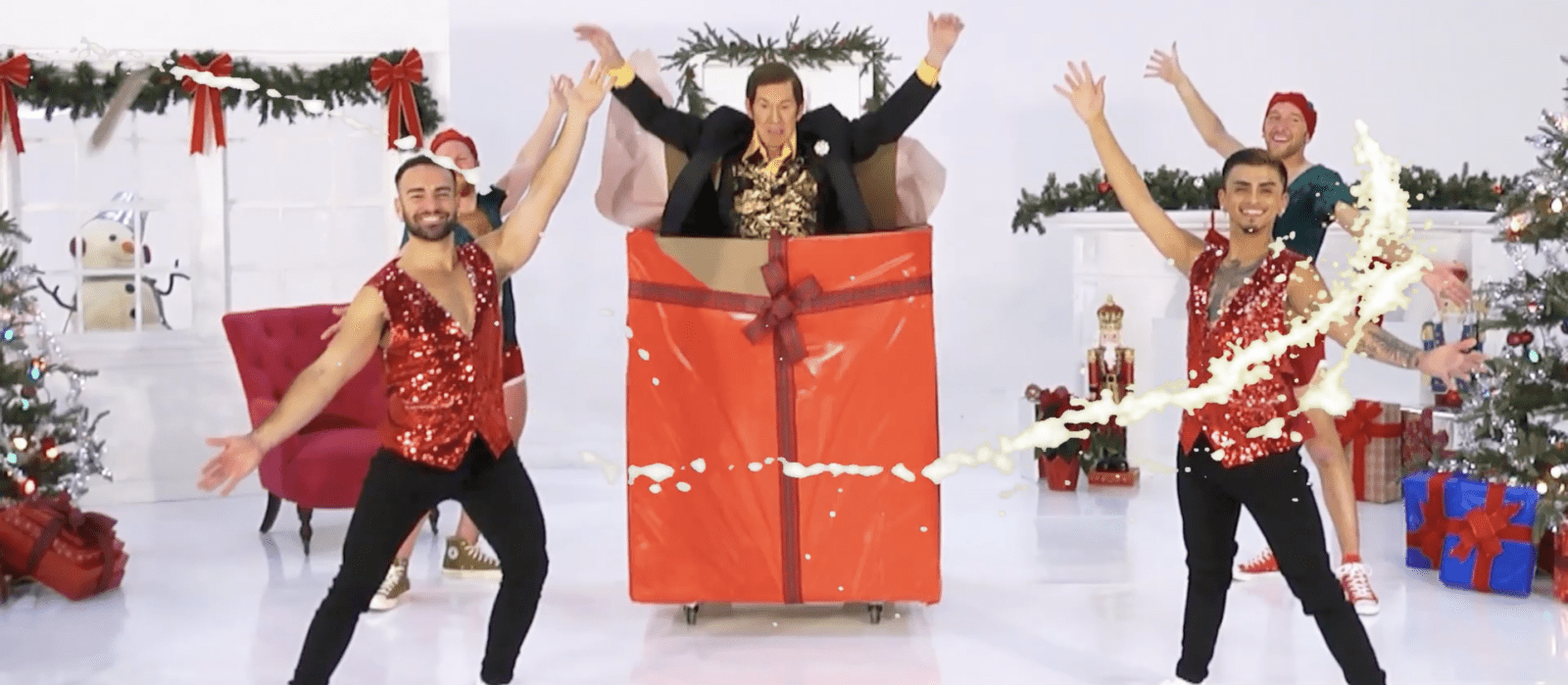
Actor Paul Lynde died over 40 years ago, and if he knew people were still talking about him, he would be stunned.
“He would roll over in his grave from his receiving position to another position because he wouldn’t believe it,” says comedy writer Bruce Vilanch. “He thought he was just a speck in the universe.”
In 1976, Vilanch co-wrote “The Paul Lynde Halloween Special,” a campy send-up of variety shows that boasted appearances by Betty White, KISS, and Margaret Hamilton (who played The Wicked Witch opposite camp icon Judy Garland in “The Wizard of Oz”).
Now, 47 years later, Vilanch returns to the seemingly endless well that is Paul Lynde-spiration for his newest project, “Making the Yuletide Gay: A Very Special Paul Lynde Christmas.”
Actor Michael Airington performs as Lynde, as he has for nearly 20 years. The special is set at Lynde’s house on Christmas Eve, where he’s visited by a who’s who of dead gay icons: Sal Mineo (David Hernandez), Bea Arthur (Jackie Beat), Tab Hunter (Spencer Day), and Liberace (David K. Maiocco). Drag queen Lady Bunny appears throughout the special with spicy adult takes on Christmas carols.
Brooklyn Magazine sat down with Vilanch to dish on writing for the Academy Awards — a gig he had from 1989 to 2014 — “Hollywood Squares,” and his new Paul Lynde holiday special. And while he was on a roll, Vilanch shared his thoughts on the 1978 “Star Wars Holiday Special” (which, surprise, he also helped write), his buddy Whoopi Goldberg, and why he thinks the “Barbie” movie is “pretty stupid.”
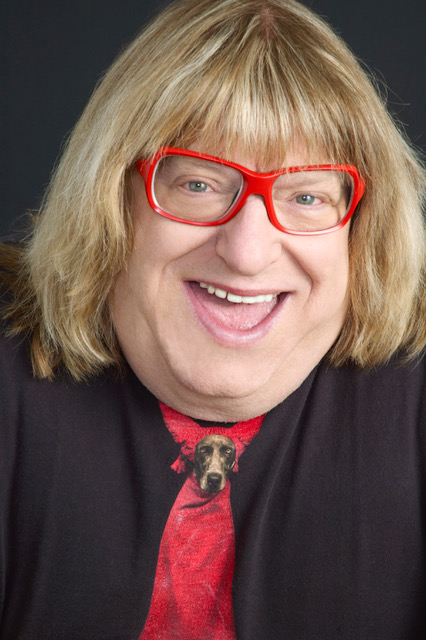
Vilanch (Courtesy of Rick Stockwell)
You started as a “chubby child model” for Lane Bryant’s Charming Chubs?
It was the highlight of my career! Lane Bryant, for those who are of another generation, is for fat women. A high-end, plus-sized chain. And apparently, they ran out of fat women and they had to go to fat children. There were not enough fat women in the country. So they had a campaign called “Charming Chubs” and I was one of the models. Next, I became a “stylish stout,” then I was “husky,” and finally I aged out. My career was over because when you’re husky nothing fits. It’s like the fashion equivalent of a voice changing in puberty. It was a brief and flamingly wonderful career.
You wrote Paul Lynde’s 1976 Halloween Special, and Michael Arrington has performed as Paul for 20 years, so if anyone should make a Paul Lynde Christmas special it’s the two of you.
One of the gifts of the internet is that crap you did 40 years ago shows up and a whole new audience begins to enjoy it and wonder how it got made. “The Paul Lynde Halloween Special” is one of those. I have a bunch of those. “The Star Wars Holiday Special,” the Brady Bunch variety show, Wayne Newton at SeaWorld — things people can’t believe exist. We did a lot of that in the ’70s and we mostly don’t remember it because we were chemically altered some of the time. Every year “The Paul Lynde Halloween Special” comes back and we thought, “Wouldn’t it be a great idea to do a Paul Lynde Christmas special?”
You have some celebrity guests in the special.
Everybody in the show is dead. Bea Arthur, Liberace.
Lady Bunny’s been dead for 50 years, right?
Well, that’s up for grabs, as is Lady Bunny.
The idea was that it’s all singing, all talking, all dead, used to be Charles Pierce‘s line about his act. He was a very well-known drag queen back in the day. So we concocted this with people who do impressions of all of these famous dead people, and gave it a through line: it’s Christmas Eve at Paul’s house and people keep showing up. The idea was to have an irreverent version of Christmas.
Paul’s biggest success was on “Hollywood Squares” because when people would ask him a question, he would do a hysterical one-liner, and that was it. He made three or four appearances every episode, and that was enough to solidify his brand, as we now call it. Lady Bunny is great in the same regard. In the special Paul opens the door, she says something ridiculous, and closes the door.
Michael Airington’s take on Lynde feels almost like drag.
I don’t know that I would call it drag, but he does what Paul couldn’t do during his lifetime and would love to have done because offstage he cursed like a fool. Paul was not allowed to refer to his sexuality. The joke always was if they got Paul’s gay jokes, they laughed. If it went over their heads, they just thought he was just a funny guy. Michael is able to actually make references to Paul’s sexuality.
When you were on “Hollywood Squares,” you were like their Paul Lynde of the ‘90s. Did you ever get in trouble for making jokes about gay sex?
I took the jokes further than Paul, and I was always getting into trouble with the standards and practices people. I would say to them, “I’m gay, but I have a love life and a sex life too, and I should be able to refer to that.” This was the argument that Ellen Degeneres used when she came out as a lesbian, and six months later her show was off the air because they didn’t want to deal with it.
They didn’t want to deal with that on Hollywood Squares, either. I would get these notes saying, “You’re too gay.” And I would tell that to Whoopi Goldberg [the celebrity center square] and she said, “Let me show you my notes. It says I’m too Black.” Our joke was she was really a gay man and I was really a Black woman. Ask anybody who’s had sex with me and you’ll understand.
What was your friendship like with Paul?
In my case, it was difficult to be friends with him because he drank so much. On one drink he was charming and on two drinks he was like the Nazi High Command. He was one of those creatures who was only happy when the light was on and he was performing. He could be fun when he was in the mood. But he was always on edge because he wasn’t doing what he wanted to do. He wanted to be a big actor and a movie star. He saw people like Woody Allen and Mel Brooks becoming movie stars. He came up with them in New York so this made him crazy. He never accepted that he was a flavor, that he wasn’t somebody who would carry a project.
Variety said Jimmy Kimmel’s Oscars monologue earlier this year “often sounded as if his material had been written by the Chatbot version of Bruce Vilanch.” It’s been a while since you’ve written for the show.
No, not officially for almost 10 years. Unofficially, people call me and say, “Help, I don’t like what they’ve written here.” I get calls but I’ve not been officially involved.
If you’re the phantom Oscar fixer, why don’t they just hire you to write the show?
I don’t get it either. Why don’t we call the Academy together and find out?
How did you get into writing for award shows? You’ve written for just about all of them.
Long story short, variety shows were replaced by award shows.
I moved out to Hollywood to be a variety show writer but cable came in right around then and it killed variety shows. If you wanted to see Madonna, you could get her on MTV 24/7. Also, the kind of people who would headline a variety show were full-service entertainers like Carol Burnett and Dean Martin, people who could sing, dance, act, and tell a joke. There were fewer of them when I moved to Hollywood and they didn’t necessarily want to do it. It became a desiccated form. In addition, “Saturday Night Live” started, and they got away with all kinds of stuff you could not get away with in prime time. So you were always being compared to that. You could never be as hip as that in prime time television.
How did you start writing for the Oscars?
After I wrote a couple of award shows, that led to the Oscars, finally. When Allan Carr, who was a very flamboyant producer, was handed the Oscar show to produce, he brought me in. That was in 1989 and I was there for 25 shows after that. Now I’m the EGOT of award show writers. I’ve done the Emmys, Grammys, Oscars, Tonys and everything else. I’m down to the American Bulimia Awards. There’s nothing left.
Which Oscars host did you enjoy writing for the most?
They’re all fun to write for … almost all of them … because you’re in the room with them every day and actually coming up with stuff. The most interesting is Steve Martin, because he’s such an oddball. I mean, because he has his own take on the world, which is quite brilliant and he was a big movie star, so the Academy loves him. He can make these observations about them, and nobody bothers. Billy Crystal has the same agency. He can make fun of them, and they know that it’s not mean. He’s not Ricky Gervais coming out and making fun of him. So it’s a delicate balance with that show. I did four shows with Whoopi Goldberg and six years with her on “Hollywood Squares.” The one that wasn’t fun was Ellen [laughs] because she was not having a good time, period, at that point in their life.
You mentioned you also wrote “The Star Wars Holiday Special.” I haven’t seen the new documentary about it, “A Disturbance in the Force,” but see that you’re in it. What’s the filmmaker’s take on the special?
Well, it answers the basic question, “How did this happen?” Because ever since Star Wars became the Scientology of the nerds, whenever they discover this thing on the internet, they say, “George Lucas, how could you betray us with this?” A lot of the documentary is about how it actually happened and nerd parsing of the Star Wars mythology. A lot of it is also funny people talking about how bad it was. That includes some of the people who worked on it, myself among them. Even if you don’t give a rat’s ass about Star Wars or about television, the whole idea of it is kind of funny.
It inspired me to write a book. I answer the question of how they happened. The book is called, “It Seemed Like a Bad Idea at the Time.” It’s a chronicle of all of these shows that I wrote, including the first Oscars show, which was the notorious Rob Lowe/Snow White show. They’re all in there. I’ve also expanded it to include Broadway and movies, you know, legendary disasters I’ve been involved in like “Can’t Stop the Music.” I discovered when I plumb the depths that they were rich with incident.
When does the book come out?
Good question. I’m talking to the publisher now. Next year sometime.
Is “The Star Wars Holiday Special” bad, or is it gay, and people don’t get it?
I believe I was the only gay writer on the show and everybody else was straight. Bea Arthur and Harvey Korman were my contributions. I must have had a loud voice in the room to get that stuff through. I write in the book that making it gay was never my intention. Only looking with a backward gaze you can say that was gay.
Is there anything else about the special that gets interpreted with a “backward gaze”?
I get these emails from people saying, “How could they allow that blackface to happen on the special?” And I say, “Blackface? What are you talking about?” First of all, Harvey Korman is playing an alien creature. It’s a humanoid, but it’s not a person. And then I went to look at it and I realized, when we made it, the makeup was purple and green. When someone is watching today through a 45th-generation knockoff of the tape, it could actually look like it was blackface. So I get what they were saying, but that’s the backward gaze again. That has nothing whatsoever to do with what we did.
You’re obviously a big purveyor of pop culture: do you have a favorite movie from this year?
Frankly, I haven’t seen enough of them. I’m going to go see “Saltburn” as soon as we are done because I hear there’s nudity and I’m all for it. I thought “Oppenheimer” was pretty terrific, I have to say. I know that politically, people wanted to see pictures of Hiroshima. They can watch “Hiroshima, Mon Amour.” I think we all know what the atom bomb did. I just thought it was amazing how this story about scientists held the screen for so long.
Did you see “Barbie”?
Oh, of course I saw “Barbie.” My reaction was, “These straight people are fucked up.” What is with this? It’s male-dominated! It’s female-dominated! Poor America Ferrera had to lose all this weight to make it into the “Barbie” movie so she could do that aria about what women go through. And I thought, “Girl, you’ve become what you’re making fun of. You become the thing that you hate. You were a big star on ‘Ugly Betty.’ What is wrong with this picture?” But it fell on deaf, pink ears, what can I tell you? I thought it was pretty stupid, frankly. I thought it was kind of a dumb movie, making an obvious point that doesn’t affect my world in the sense that I’ve always worked with powerful women.
I thought we were past that, frankly. I thought one of the gifts of #MeToo was that we had moved on to another level of society, but what do I know? This may be Greta Gerwig’s vision. I mean, she’s great. She’s a real artist and has a real vision. I’ve met her and worked a little bit with her, but I think this was her vision and she’s welcome to it. I wasn’t crazy about it. It was a very well-made movie. It was gorgeous. I do wanna live in one of the pink houses. I’ll even take Kate McKinnon’s house.
Okay, I’ve held you for long enough. Have fun seeing Barry Keoghan’s penis in “Saltburn.”
I yearn.
“Making the Yuletide Gay: A Very Special Paul Lynde Christmas” is available to rent on Amazon starting December 15.
The post Bruce Vilanch resurrects Paul Lynde for Christmas, and other hyperbole appeared first on Brooklyn Magazine.
Source link

